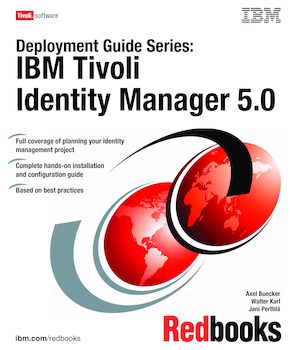Deployment Guide Series: IBM Tivoli Identity Manager 5.0
An IBM Redbooks publication
Note: This is publication is now archived. For reference only.

Published on 10 December 2008
ISBN-10: 0738432067
ISBN-13: 9780738432069
IBM Form #: SG24-6477-02
Authors: Axel Buecker, Walter Karl and Jani Perttila
Deploying an identity management solution for a medium size business begins with a thorough analysis of the existing business and IT environment. After we fully understand the organization, their deployed infrastructure, and the application framework, we can define an applicable representation of these assets within an identity management implementation.
This IBM® Redbooks® publication, intended for IBM Business Partners, takes a step-by-step approach to implementing an identity management solution based on IBM Tivoli® Identity Manager. Part 1 discusses the general business context and the planning approach for an identity management solution. Part 2 takes you through an example company profile with existing business policies and guidelines and builds an identity management solution design for this particular environment. We describe how the components can be integrated into the existing environment. Then, we focus on the detailed configuration of identity management integration tasks that must be implemented in order to create a fully functional end-to-end solution.
This IBM Redbooks publication does not introduce any general identity management concepts, nor does it systematically explain all of Tivoli Identity Manager's components and capabilities; instead, those details are thoroughly discussed in the IBM Redbooks publications: Identity Management Design Guide with IBM Tivoli Identity Manager, SG24-6996, and Enterprise Security Architecture Using IBM Tivoli Security Solutions, SG24-6014.
Part 1. Planning and deploying
Chapter 1. Business context for Identity and Credential Management
Chapter 2. Planning for the client engagement
Part 2. Client environment
Chapter 3. Company profile
Chapter 4. Solution design
Chapter 5. Installing the components
Chapter 6. Configuring Identity Manager
Chapter 7. Identifying initial tasks
Appendix A. Troubleshooting
Appendix B. Rapid Installer Option
Appendix C. Import/export
Appendix D. Self-service
Appendix E. Statement of work